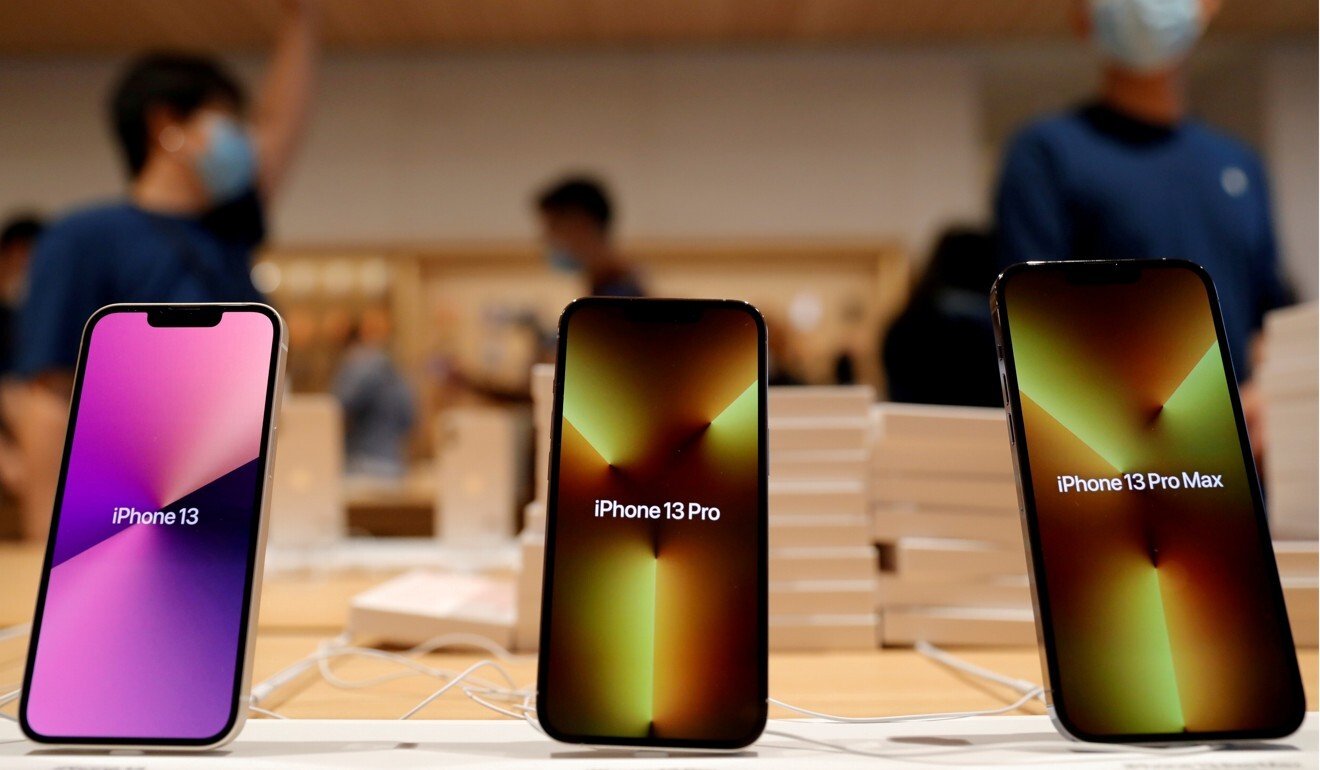
Chinese iPhone 13 buyers decry long delays on social media as supply shortages hit Apple amid robust demand
- Chinese microblogging site Weibo is flooded with complaints about long wait times for the iPhone 13 amid delays Apple is facing in its supply chain
- Analysts see this as a sign of Apple’s continued popularity in the world’s second-largest economy, but supply shortages remain a drag on sales
Mei, who works in e-commerce in southeastern Fujian province, turned to social media as an outlet for her frustration. “Please start shipping today! It’s been a whole month, and I’m losing my patience,” she posted to Weibo on Monday, five days before Apple’s promised delivery date.

Since launching last month, the iPhone 13 has proven immensely popular in China. An order for the 256-gigabyte iPhone 13 Pro in Sierra Blue, for example, will currently take 37 to 44 days to ship to China’s southern tech hub of Shenzhen, according to Apple’s website.
In addition to venting on social media, anxious consumers like Mei are using Weibo to share the latest developments of their orders. Mei said she routinely checks the iPhone 13 Pro ‘super topic’, a discussion page set up by users on the microblogging site, to see if other users have received their phones yet or if there have been any problems after delivery.
“We even have a social media group with over 100 members whose orders haven’t started shipping. There are a lot of people who have been waiting for over 30 days like me,” Mei told the South China Morning Post on Monday.
The tech industry has been plagued by supply shortages and reduced manufacturing capacity amid the Covid-19 pandemic. The biggest problem this year has been a global semiconductor shortage.
Chinese consumers rush to order cheaper iPhone 13, clogging websites
“A longer delivery time usually reflects strong demand for iPhones,” said Will Wong, an analyst at market research firm IDC in Singapore. “Nevertheless, the component supply shortage also plays a role this year by having some impact on iPhone production.”
“Demand is very robust,” Cook said, but added that the chip shortage, which is affecting most of the company’s products, will continue through the current quarter.
While Apple’s total revenue was up 29 per cent year on year to US$83.4 billion, it fell short of analyst projections for the quarter. Sales in Greater China, which includes Hong Kong and Taiwan, far outpaced global growth, jumping 83 per cent to US$14.6 billion.
Until recently, Apple had avoided the worst effects of the global chip shortage, which has most drastically impacted the automotive industry. As component and capacity shortages have dragged on, the impact is being felt by the makers of smartphones, laptops, washing machines and refrigerators.

02:08
China iPhone 13 launch draws crowds as phone fans eye Apple’s new handsets
Apple has reportedly been unable to secure enough chips from Broadcom and Texas Instruments. The company has slashed its manufacturing goal by 10 million iPhones from its original plan of 90 million units this year, Bloomberg reported this month.
Eric Tseng, chief executive of Taiwan-based research firm Isaiah Research, said Apple is actually facing delays rather than reduced production.
“Besides chip shortage from TI and Broadcom, we believe the main bottleneck may be the camera module supply from Sharp, due to the Covid-19 outbreak in Vietnam,” Tseng said. “According to our checks, we haven’t heard that Apple has reduced the iPhone 13 series production and shipment forecast yet.”
Tseng estimated that the shipment of 3 million to 5 million units could be delayed to next year if this issue continues.
Chinese AI firm pushes Siri claim to stop Apple’s iPhone production, sales
Despite delays and a constant stream of complaints on social media, there is no sign that Apple is losing its lustre among Chinese consumers, according to IDC’s Wong.
“I don’t expect those consumers to ditch iPhones and turn to other brands,” he said. “Seeing them complaining on social media is reflecting how desperate they are to have the new iPhones in hand.”
While Apple is facing delays around the world, the long wait times have left Chinese consumers particularly frustrated because of their proximity to the world’s largest iPhone assembly factory in Zhengzhou, in central Henan province.
The iDPBG account had two videos on Douyin as of Friday showcasing the factory’s preparation for the new recruitment season that starts next month.
“[We have] generous bonuses for new recruits and stable overtime hours,” a recruiter said in one of the videos. “We looking forward to having you on board.”
Analysts have remained optimistic about robust demand for the iPhone 13 series and downplayed the impact of delays.
Dan Ives, managing director at investment firm Wedbush Securities, said in a research note last week that the chip shortage is “transitory”. He also noted that roughly 250 million iPhone users, out of 975 million total, have not upgraded their smartphones in more than three-and-a-half years.
To Ives, that means robust iPhone demand is set to continue.
Additional reporting by Che Pan.

